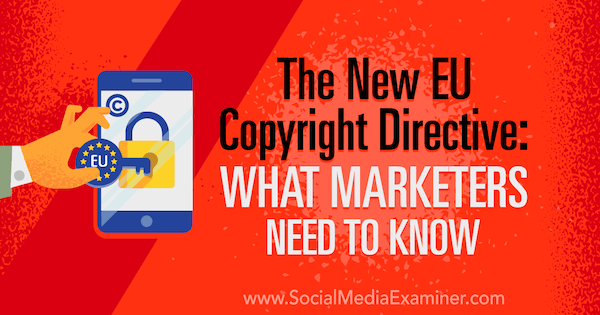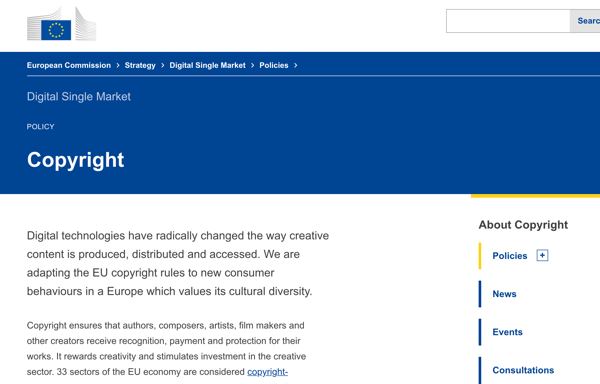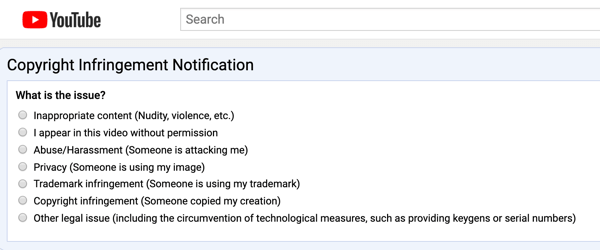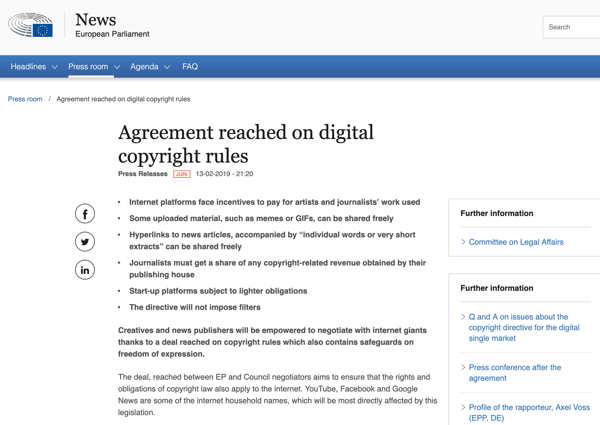Concerned about the European Union's Copyright Directive? Wondering how this new rule could impact your marketing?
In this article, you'll learn about what parts of the European Union's Directive on Copyright will impact the use of social media for both businesses and individuals.

What Is the EU's Directive on Copyright Article 17?
The EU Copyright Directive's Article 17 (formerly Article 13), “Use of protected content by online content sharing service providers”, is making many people and companies very nervous.

The EU hasn't updated copyright laws in almost 20 years. For the past 2 years, the European Council has been working on this Directive and recently passed Article 17 (known as Article 13 in draft). This article changes the way social media platforms will have to deal with copyrighted materials.
As it currently stands in Europe (and in the United States), owners of copyrighted content (videos, pictures, etc.) have to let the social media platform know of a violation and then the company pulls the content. The copyright owner has the right to bring a copyright infringement claim only against the person who wrongly uploaded the content; the platform has ‘safe harbor' protection as being merely the host and not a part of the infringement.

With Article 17, the social media platform would now also be liable for copyright infringement. Let that sink in.
What does this look like? Let's say Henrich Smith in Germany uploads a pirated version of the latest Avengers movie to YouTube. Not only can Walt Disney Studios Motion Pictures sue Smith for copyright infringement, they can also sue YouTube. Or let's say someone in Italy uploads a copyrighted picture to their Facebook page without the correct permission. Facebook could be held liable.
How Will Social Media Platforms Move Forward?
Obviously, companies (and users) are in an uproar over this new law. The financial impact of potentially being held liable to movie studios, musical artists, and others for copyright infringement is simply too high to imagine for a European startup or growing tech platform.
There are a couple of options for companies to consider:
- Prepay. Platforms like YouTube, Facebook, and Twitter could prepay studios and artists for copyrighted content. This would involve attempting to predict every piece of content that could potentially be uploaded. This option is unlikely.
- Give up the market. This option is potentially likely.
- Create filter systems to detect copyrighted content and require extensive proof of ownership before anything can be uploaded. This option is most likely.
The larger U.S.-based social media platforms likely already have the proper technology in place (like YouTube's ContentID) or can afford to figure it out. But the impact is huge when you think of all of the places on the internet where people are uploading content, from the obvious ones already mentioned here to others like Amazon, OK Cupid, and many more.

Discover Proven Marketing Strategies and Tips
Want to go even deeper with your marketing? Check out the Social Media Marketing Podcast! Publishing weekly since 2012, the Social Media Marketing Podcast helps you navigate the constantly changing marketing jungle, with expert interviews from marketing pros.
But don’t let the name fool you. This show is about a lot more than just social media marketing. With over 600 episodes and millions of downloads each year, this show has been a trusted source for marketers for well over a decade.
While smaller companies that are less than 3 years old, have less than 5 million unique visitors per month on average, and bring in less than €10 million in annual revenue are exempt, the above options likely won't be possible for middle-of-the-road companies trying to scale and compete with the bigger platforms that can afford the technology to filter—potentially stifling competition. This is another reason so many are against this new Directive.
What Types of Content Does the EU Copyright Directive Affect?
The EU Council has put out a press release stating that ‘some' materials, such as memes, GIFs, and news article extracts, can be shared freely. The release also states that startups are subject to lighter obligations (as noted above).
Get World-Class Marketing Training — All Year Long!
Are you facing doubt, uncertainty, or overwhelm? The Social Media Marketing Society can help.
Each month, you’ll receive training from trusted marketing experts, covering everything from AI to organic social marketing. When you join, you’ll also get immediate access to:
- A library of 100+ marketing trainings
- A community of like-minded marketers
- Monthly online community meetups
- Relevant news and trends updates

However, once platforms start using filters for content, the reality is that users will have less access to content and potentially be unable to share their own content (even if they own it).
Creators and those running businesses through sharing content on social media will potentially have content blocked or will be left to find platforms that aren't so strict. Many critics say Article 17 is a very slippery slope leading to censorship and surveillance.
Conclusion
The Directive on Copyright in the Digital Single Market, also known as the EU Copyright Directive, will change the face of social media in Europe and could eventually impact the world.
This law passed the European Parliament Plenary vote at the end of March and recently went through ratification by the European Council. The vote passed on April 15, and EU member states have up to 2 years to figure out implementation.
While this Directive only impacts Europe, there's no doubt it could spread globally. Companies and users around the world are watching to see how this very unpopular law continues to progress.
*Nothing in this article is intended to be legal advice and is for educational purposes only.
What do you think? How deeply will Article 17 (formerly Article 13) affect your marketing strategies and tactics? How do you think platforms will respond? Share your thoughts in the comments below.
More articles on social media and the law:
- Learn how to keep your YouTube channel and content legal.
- Discover how to legally safeguard your blog content from copyright infringement.
- Learn how to legally share or regram others' Instagram posts.
Attention Agency Owners, Brand Marketers, and Consultants

Introducing the Marketing Agency Show–our newest podcast designed to explore the struggles of agency marketers.
Join show host and agency owner, Brooke Sellas, as she interviews agency marketers and digs deep into their biggest challenges. Explore topics like navigating rough economic times, leveraging AI, service diversification, client acquisition, and much more.
Just pull up your favorite podcast app, search for Marketing Agency Show and start listening. Or click the button below for more information.

